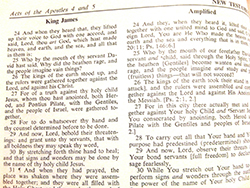16 April 2012
Debt Series: Simple Truth #3 - Don't Cosign!

Click here to listen to this podcast
When you become a cosigner, you contractually join with another person by agreeing to assume the responsibility of repaying a debt if for any reason that primary borrower is unable to fulfill the payment terms.
To break this down, as a cosigner, you say “I got your back for this financial debt”
As we look at scripture, note that Cosign, Surety and Guarantor are words that are used interchangeably in the Christian Holy Bible.
There are several direct scriptural references to the practice of cosigning and most of these are located in the Bible book of Proverbs.
The Bible book of Proverbs is known to contain some of the earliest records of life instruction. Many of the proverbs are written by Solomon, and they reflect his great wisdom.

Solomon, the son of King David, succeeded his father and also became a great king of Israel. At one point Solomon presented a large burnt offering to the Lord and God appeared to him and said “Ask, What shall I give you?” Solomon’s response was that his desire was for wisdom, an understanding heart and discernment as needed to lead those people that were under his rule as king. The Lord was pleased with Solomon’s response and his offering and granted his request for great wisdom. As a bonus God also blessed Solomon with what he did not request – riches and honor. With these blessings there was no king like Solomon in his past and there would be no other king like Solomon in the future. For reference, this is found in scripture in 1 Kings 3:3-13.
The practice of cosigning is discouraged in God’s word.
Let’s step back a bit… After all, I am talking about the Christian Holy Bible. I know that there are instructions in there that instruct us to partner together, love one another, love your neighbor as yourself, do unto others as you would have them do unto you and to not be a lover of money. Knowing that these instructions are in the bible, does it seem that these instructions would support the case of bonding with your brothers and sisters during their financial time of need? If we’re striving to live our lives following Christian biblical principles, should we adopt the practice of cosigning?

From what I’ve learned from the scriptures… the answer is no.
Let’s reVerse…
Let’s review what the scriptures say about the practice of cosigning:
Don’t cosign!
“Do not be one of those who shakes hands in a pledge, One of those who is surety for debts.” Proverbs 22:26 NKJV

Those that don’t understand cosign for debts…
“A man devoid of understanding shakes hands in a pledge,and becomes surety for his friend.”
Proverbs 17:18 NKJV
The meaning of these two proverbs is very clear – Don’t cosign!
When you cosign for a loan it may feel like you’re simply doing a favor for a friend. Let me summarize what may happen in a scenario like this.
You have a friend that wants to make a purchase. In attempting to make the purchase, your friend finds that financing is required. Your friend’s financial status is not one that will allow him/her to qualify for financing on their own. The business establishment tells them that if they had a cosigner, the transaction can be completed. Your friend contacts you and requests that you cosign for them – you won’t have to make any payments because they have the means to make the payments, they just can’t qualify for the loan on their own.
You say “Ok, I can do that”.
You and your friend get together and physically go to the business establishment to make the purchase. When you arrive, there is a loan officer present. A loan contract is drawn up and on it is a place for signatures for your friend as the primary borrower and for you as the cosigner.
Everyone signs the documents, everyone smiles, everyone leaves. The transaction is completed. Easy favor to do!
Now what really happened is that as the cosigner you’ve entered into a debt obligation in the full amount of the purchase even though you may not have to make any payments and you walked away from the transaction without any merchandise.
Those that cosign should not be deemed as financially trustworthy
Proverbial wisdom instructs us to embrace the understanding that cosigning is not a good practice and to avoid entering into such agreements. As for those that do not adopt this as a life standard, Christian wisdom supports that these individuals should not be deemed as financially trustworthy. For this reason, when doing business with such individuals, you should demand a strong security deposit. Note this scripture:
“Take the garment of him who is surety for a stranger,
And hold it in pledge when he is surety for a seductress.”
Proverbs 27:13 NKJV
In bible times, taking the garment of an individual was a way of holding something of value from that person as an assurance that they will repay a debt. This proverb advises us to do this when we enter into an agreement with an individual that has cosigned debts – a way of stating that this person should not be deemed as financially trustworthy.
Today our credit worthiness is determined by our credit score. Note that cosigned debts contribute to your overall debt load in same way as it would if you were the primary borrower. The net effect of this is that if you cosign for others, you will have more debt and your credit score will be lower than it would if you avoided cosigning. If you later have a need to finance a purchase it is more likely that you will have a higher interest rate, security deposit requirement or even require a cosigner with better credit as a part of the contract with you. This is one way that our country's financial systems implement this instruction.
The last part of verse 13 in Proverbs Chapter 27 references the holding of the garment if you know that this individual has debts with a seductress or what the King James translation of the bible calls a “strange woman”.
I’m not going to offer a detailed explanation of this. I’m just saying…
If you cosign you will suffer for it. You should hate this practice.
Christian wisdom even speaks as strongly as noting that if you cosign for another’s debt, you will suffer and that you should hate this practice. Here’s the verse:
“He who is surety for a stranger will suffer, but one who hates being surety is secure.” Proverbs 11:15 NKJV
Think you’ve blown it by cosigning in your past?
I know what you may be thinking…
“I didn’t understand these principles but now I have a better idea of what God’s word says about the practice of cosigning. But I’ve already cosigned for someone. Does this mean that God is going to hold back his blessings for me? Am I sentenced to a life of poverty or eternity in Hell?” My response to you is that by faith, you’re going to be better after reading this than you were before. From this point forward, commit to become a doer of God’s word, not a hearer only. Thanks for God’s love and his redemption power, you can make life adjustments that allow you to better align with these biblical principles. You’ll be able to realize a financial life that reflects his promises to us in this area. I am convinced of this!! Praise God from whom all blessings flow!!
What to do if you’ve already cosigned for someone…
Another thing that’s true is that the Lord knew that by the time some of us started to seek this wisdom, we would have already operated in opposite of the advice. With this in mind, there are biblical instructions on what to do if we have already cosigned for a debt.
“My son, if you become surety for your friend,
If you have shaken hands in pledge for a stranger,
You are snared by the words of your mouth.
You are taken by the words of your mouth.
So do this, my son, and deliver yourself,
For you have come into the hand of your friend:
Go and humble yourself.
Plead with your friend.
Give no sleep to your eyes,
Nor slumber to your eyelids.
Deliver yourself like a gazelle from the hand of the hunter,
And like a bird from the hand of the fowler.”
Proverbs 6:1-5 NKJV

The biblical instructions of how we reverse our cosign obligations is to humbly go to the one that we cosigned for and plead with them to release us from this debt agreement. Don’t demand or pose threats – remember that you willingly signed this agreement. Ask them to forgive you for making this commitment because you were not aware of God’s direction for situations like this, if this is indeed the case. Again, your request is to be released from your unwise financial decision to cosign. Be persistent! Once you follow these advised steps, repent for cosigning (vow to the Lord to not repeat this behavior) and rest in Him. Regardless of the outcome of your actions to be released of this debt obligation, you can rest assured that your commitment to operate under God’s financial principles going forward will be honored and you will see the benefits.
To make things clear, to have the borrower / cosigner relationship severed, the primary borrower must seek ways to refinance this debt without naming you as a cosigner. If there has been a history of timely payments, it may be that a cosigner is no longer needed. Key thing to note here is the fact that the primary borrower will have to take the action to release you from this debt obligation by seeking alternative financing options.
If you’ve asked someone to cosign for you on a loan, reverse these actions! As the primary borrower, seek out ways of refinancing in an effort to remove that cosigner from your loan agreement. When you find alternative ways of financing, approach that cosigner and let them know that your desire is to release them from this debt.
Don’t cosign!

I was made aware of this principle years before I knew that it existed in the Bible. Somehow I knew that this was the way that I should operate even though I had not been approached to be a debt cosigner. I made a decision to make this a personal way of operating. A key thing that I knew that I needed to do was to communicate this decision to my family, The way that I chose to do that was during a Christmas holiday gathering in the late 1980’s. I did not spoil the gathering with a smart aleck: “Don’t call me, I’ll call you” blurts, but I did take the opportunity while all of my siblings were present to share with them that I would say no to all requests to cosign any loans. No one had asked me to cosign in the past so this statement was met with the snappy responses of: “Who asked you to cosign anyway? Nobody? So shut up!!” The holiday festivities were not spoiled in any way by these casual conversations. I took the opportunity to repeat my position during other occasions when we all were present so that I was speaking to everyone as a group. Everyone understood and respected my position.
Later in life there were calls from family members requesting that I would help them out by cosigning and partnering with them for debt obligations – mainly auto loans. For each of these calls, I politely declined the opportunity to cosign. These phone conversations were times of reminding my family member that I was not choosing to single them out and refusing to help them but instead that I was honoring a principle that I had chosen to live by and had shared with them in earlier years. On occasion I did offer to assist by providing a one-time cash contribution to the cause. In most cases, the lender wanted a cosigner, so the cash assistance would not prove to be beneficial in those cases. I am pleased to share with you that there were no family relationship issues that resulted from my decision to avoid cosigning.
Approximately 15 years after first communicating to my family that I would not cosign debts, I learned that my “intelligent” fiscal life choice is a principle that is biblical wisdom clearly outlined in scripture.
What are your current life ideas and practices on the topic of cosigning? Please take the opportunity to share with me your ideas on this topic by completing an anonymous survey. There are five questions to this survey and it should take approximately 90 seconds of your time. I will gather the statistics of this and all Money reVerse surveys and use this information in future blog posts.
Click here to access this survey.
http://www.zoomerang.com/Survey/WEB22FFDVAVX5J
It is wise to avoid cosigning. As I noted in earlier references in this series, the Lord is our Source and He wants us to seek Him for our needs. When we ask someone to cosign for us, we are seeking others to cover for our financial shortcomings. When we become cosigners, we’re choosing to operate in a way that is in direct conflict to Christian Biblical instruction.
Commit to follow God’s financial principles and get ready to see the manifestation of His promises. Be blessed in your financial life!

Carolyn M. Williams
To read my previous article in this series Click Here
